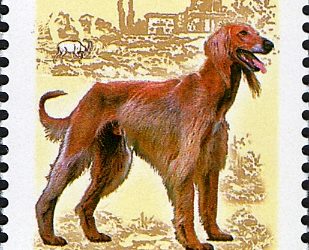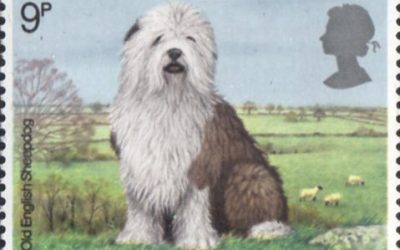Stamp of the day
DOGS ON STAMPS: Shiba Inu
Shiba means "little dog" in Japanese and is a very old breed that originated in the mountainous Japanese countryside. Shiba-like dog types have been known for over 3000 years, and remains of such dogs are, among other things, found in ruins from around 500 BC. Todays...
DOGS ON STAMPS: Dachshunds
“Dachshunds” originally originated in Germany, where in the Middle Ages they were probably bred from the Bracke hunting dog breed. Official breeding outside the nobility has existed since the end of the 19th century, a standard for the breed however only since 1925....
DOGS ON STAMPS: Rough Collie
Rough Collies (and their cousins, Smooth Collies), originated in the Scottish Highlands in the 18th century, where they were bred with great care by farmers and shepherds to possess ideal traits for herding and guarding hardheaded flocks of sheep: a mix of...
DOGS ON STAMPS: Afghan Hound
The “Afghan hound”, is a breed of dog developed as a hunter in the hill country of Afghanistan. It was once thought to have originated several thousand years ago in Egypt, but there is no evidence for this theory. It was brought to Europe in the late 19th century by...
DOGS ON STAMPS: Old English Sheepdog
“The Old English Sheepdog” first emerged at the beginning of the 18th century as a "drover's dog," used largely for driving sheep and cattle into the markets of the metropolis. Todays stamp (9 pence) showing “The old English Sheepdog” is from Great Britain.
DOGS ON STAMPS: Newfoundland Dog
Todays stamp is the first postage stamp with a dog. It was issued in 1887 and it features a Newfoundland dog. Since this first stamp made its appearance in the stamp world, many dog breeds have since sniffed their way onto our collectible postage stamps. The next days...
BRITISH COLONIES – Barbados
Barbados was first occupied by the British in 1627 and remained a British colony until internal autonomy was granted in 1961. The Island gained full independence in 1966, and maintains ties to the Britain monarch represented in Barbados by the Governor General. It is...
BRITISH COLONIES – Bahamas
The Bahamas became a British crown colony in 1718, when the British clamped down on piracy. After the American Revolutionary War, the Crown resettled thousands of American Loyalists to the Bahamas; they took enslaved people with them and established plantations on...
BRITISH COLONIES – Western Australia
The first recorded European contact was in 1616, when Dutch explorer Dirk Hartog landed on the west coast. Although many expeditions visited the coast during the next 200 years, there was no lasting attempt at establishment of a permanent settlement until December...
BRITISH COLONIES – Victoria (Australia)
In 1849 Vancouver Island became a British crown colony with Fort Victoria as its capital. More settlers arrived, and a small village arose near the fort. By the early 1850s the village site had been formally surveyed, and in 1852 the settlement was named Victoria....
BRITISH COLONIES – Tasmania (Australia)
Taken by the British in the early 1800s and made a colony in 1825, Van Diemens Island was used as an auxiliary penal settlement until the 1850s. It was granted self-government and renamed Tasmania in 1856, and it became a state of the Australian Commonwealth in 1901....
BRITISH COLONIES – South Australia
The South Australia Act, 1834 created the Province of South Australia, built according to the principles of systematic colonisation, with no convict settlers. After the colony nearly went bankrupt, the South Australia Act 1842 gave the British Government full control...
BRITISH COLONIES: Queensland (Australia)
Europeans settled in Queensland in 1825 when Brisbane was selected as a penal settlement for the more difficult convicts. The penal settlement was officially closed in 1839 and the land was prepared for sale for permanent settlement. Queensland was originally part of...
BRITISH COLONIES – New South Wales (Australia)
New South Wales was the first Australian colony to be established by the British. The southeastern coast of the continent was first sighted by Europeans in 1770 on the first voyage of Capt. James Cook, who took possession of what he called New South Wales in the name...
BRITISH COLONIES – Ascension
Ascension Island is an isolated volcanic island, 7°56′ south of the Equator in the South Atlantic Ocean. Ascension Island was discovered by the Portuguese navigator João da Nova in 1501 and named Conception Island, but was rediscovered in 1503 on Ascension Day by...
BRITISH COLONIES – Antigua
The tropical islands of Antigua and Barbuda are located in the heart of the Caribbean about a thousand miles to the east of Jamaica and half that distance from Trinidad on the coast of South America. Antigua was visited in 1493 by Christopher Columbus, who named it...
BRITISH COLONIES – Aden
Aden, situated on the south coast of what is now Yemen, was a British colony since 1839. Commanding the southern entrance to the Red Sea, it was an important British air- and naval base on the route to India. It was also crucial for safeguarding access to Middle...
ORCHIDS ON STAMPS
Cypripedium calceolus is a “lady's-slipper orchid”, and the type species of the genus Cypripedium. It is native to Europe and Asia. Cypripedium comes from the Greek Κυπρισ πεδιον (Kupris pedion), meaning Venus' foot (a reference to the Roman goddess Venus). Calceolus...
ORCHIDS ON STAMPS
Phalaenopsis schilleriana or the “Sunset glow” because of the beautiful pink flowers, was first described by H.G. Reichenbach in 1860 and named after Consul Schiller who first flowered the orchid two years earlier. The species is endemic to the Philippines where it...
ORCHIDS ON STAMPS
Cleistes(iopsis) divaricata, commonly called Rosebud Orchid or the Spreading pogonia, is found throughout the southeastern United States, from New Jersey south to Florida and across the Gulf Coast to Texas. This orchid's petals and labellum separate only near the...
ORCHIDS ON STAMPS
The Vanda is an orchid which is widespread in nature, from India and Sri Lanka to Northern Australia. The Vanda grows and blooms on trees. The roots hang loose in the air or are wrapped around the tree. The Vanda was discovered in 1613 by Alvin Semedo, who called it...
ORCHIDS ON STAMPS
Thelymitra campanulata, commonly called the “bell sun orchid” or “shirt orchid”, is a species of orchid in the family Orchidaceae and is endemic to the south-west of Western Australia. It is a common species with a single narrow leaf and up to fifteen distinctly...
ORCHIDS ON STAMPS
“The Southeast Asian Lady's Slipper Orchid” (Paphiopedilum lowii). With pouches full and petals tipped in pink, Paphiopedilum lowii swoops down like a pelican in search of food. Endemic to Borneo and the Malay Peninsula, this southeast Asian lady's slipper blooms in...
ORCHIDS ON STAMPS
Dendrobium crumenatum, commonly called the “pigeon orchid”, is an epiphytic orchid in the family Orchidaceae and is native to Asia, Southeast Asia, New Guinea and Christmas Island. It has two rows on leaves along its pseudobulb and relatively large but short-lived,...
ERRORS ON STAMPS – find the “flyspeck”
Today's stamp is from Denmark and issued in 1912. It shows Copenhagen's Central Post Building and has a face value of 5 kroner. The stamp has an error which increases its value from 1.300 to 3.500 Danish kroner. Find the error and give your answer in the comment...
ERRORS ON STAMPS – find the “flyspeck”.
Todays stamp from the Falkland Islands shows the portrait of King George VI. He was also called Prince Albert, duke of York, in full Albert Frederick Arthur George, born in 1895 and died in1952king of the United Kingdom from 1936 to 1952. The stamp also show a map of...
ERRORS ON STAMPS – find the “flyspeck”
Todays stamp is from the Dutch Indies (1870) showing the portrait of King Wilhelm III. He was born in 1817 in Brussels and died in 1890 in Apeldoorn. He was King of the Netherlands and Grand Duke of Luxembourg 1849 – 1890. He was the son of William II of the...
ERRORS ON STAMPS – find the “flyspeck”
I hope you find plate errors an exciting part of philately. In the next few days, you must try yourself to see, if you can find the error. Today's stamp is from Denmark and has a very significant error. It was issued in 1904 and the error increased the value of the...
ERRORS ON STAMPS – “flyspeck”
Many stamp collectors love to collect variants, so-called plate errors on stamps. Some hate it and call the small “dots” for “flyspeck”. But even small plate errors can increase the value of stamps dramatically. Today's stamp is from the Allied occupation of Germany...
ERRORS ON STAMPS – inverted center
I have decided to show yet another specimen of a reverse center stamp. Just four days ago, on June 3, 2023, a Japanese stamp from 1871 (500 mon) was sold for no less than 5.4 million euros to a Japanese collector. The sale was conducted by the auction company David...






























